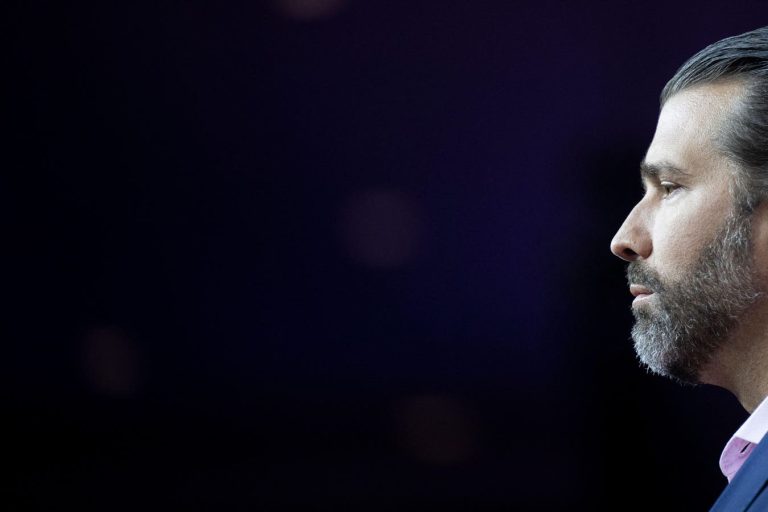Reentering the scene: Donald Trump Jr., who owned a small share of his father’s D.C. hotel, comes back to Washington with a new plan.
Photo by BRENDAN SMIALOWSKI/AFP via Getty Images
News that Donald Trump Jr. and a team of investors are launching an invite-only club named Executive Branch has Washington buzzing about who might join. The first person to sign up was David Sacks, the president’s crypto and artificial-intelligence czar, who opted for a $500,000 top-tier membership. “It’s very simple,” Sacks said on the “All-In” podcast last week. “We want a place to hang out in D.C.”
In the president’s first term, the Trump International Hotel served as the de facto MAGA lounge. But the Trump family sold that asset in 2022, creating an opportunity for a place like Executive Branch to establish itself as the second-term spot to relax, schmooze and scoff at ethics. Amid the similarities between the two establishments, one critical difference stands out: The new club seems to have a much smarter business plan.
For all the attention that the Trump hotel attracted, it was not a particularly profitable operation, at least until the president sold it. Donald Trump invested more than $200 million into the place, which opened shortly before the 2016 election. The Trump connection helped fill rooms on certain nights, like during the inauguration, when the president-elect charged $18,000 a night for a suite. But on more mundane occasions, the place sometimes emptied out, with the name above the door alienating travelers.
The Trumps did not achieve their projected room rates or occupancy levels, leading to net operating losses in three out of the hotel’s first four years, according to internal financial documents released by the House Oversight Committee in 2021. (Reports compiled by Trump lender Deutsche Bank showed rosier numbers, but they still listed losses in two of the four years.) Reviewing the internal records this week, Morningstar analyst Kevin Brown came away unimpressed. “It doesn’t seem like it’s necessarily well-run,” he said. “You should be able to generate positive margins, and these are flat to negative.”
There was one bright spot, however—the food-and-beverage business, which might typically account for a quarter of a hotel’s revenue. At the Trump hotel, outfitted with a plush lobby and expansive banquet spaces, food-and-beverage sales composed nearly 50% of the revenue each year. That points to one reason why the new operation seems more likely to succeed. The Executive Branch appears to lean into the Trump family’s strength (drawing a crowd) while steering clear of its weakness (filling hundreds of hotel rooms each night). “Talk about taking advantage of your relationships,” says hospitality veteran Joel Paige. “It’s going to be very successful.”
Also key to the plan: A membership structure, which will allow the club to generate big fees up front. Sacks and Chamath Palihapitiya, another Silicon Valley investor, said they were two of roughly 10 people who signed up to be founding members, which costs a half-million dollars. Some members will come in at a lower price point, according to Sacks, who did not specify the cheaper rate. Others reported to be involved in the venture include Tyler and Cameron Winklevoss, the crypto billionaires; Alex and Zach Witkoff, sons of Trump special envoy Steve Witkoff; and Omeed Malik and Christopher Buskirk, Don Jr.’s business partners.
It seems likely the club will find people willing to join the party. In a 2016 deposition, Donald Trump fielded a question about how his initial presidential campaign had impacted his business. “I could tell you one example where it has actually been very positive,” Trump said. “The manager told me recently. He said, ‘Boy, it is actually the best year we’ve ever had at Mar-a-Lago.’ And I was looking at the numbers. I said, ‘What do you attribute this to?’ He said, ‘The campaign.’” That trend continued in later years, as revenue from initiation fees surged, boosting operating income from about $2 million in 2014 to $22 million in 2022.
Numbers like that teach lessons, and it seems the Trumps—who struggled to cash in during the president’s first term—now understand that private clubs provide a great venue for squeezing profits from politics.


